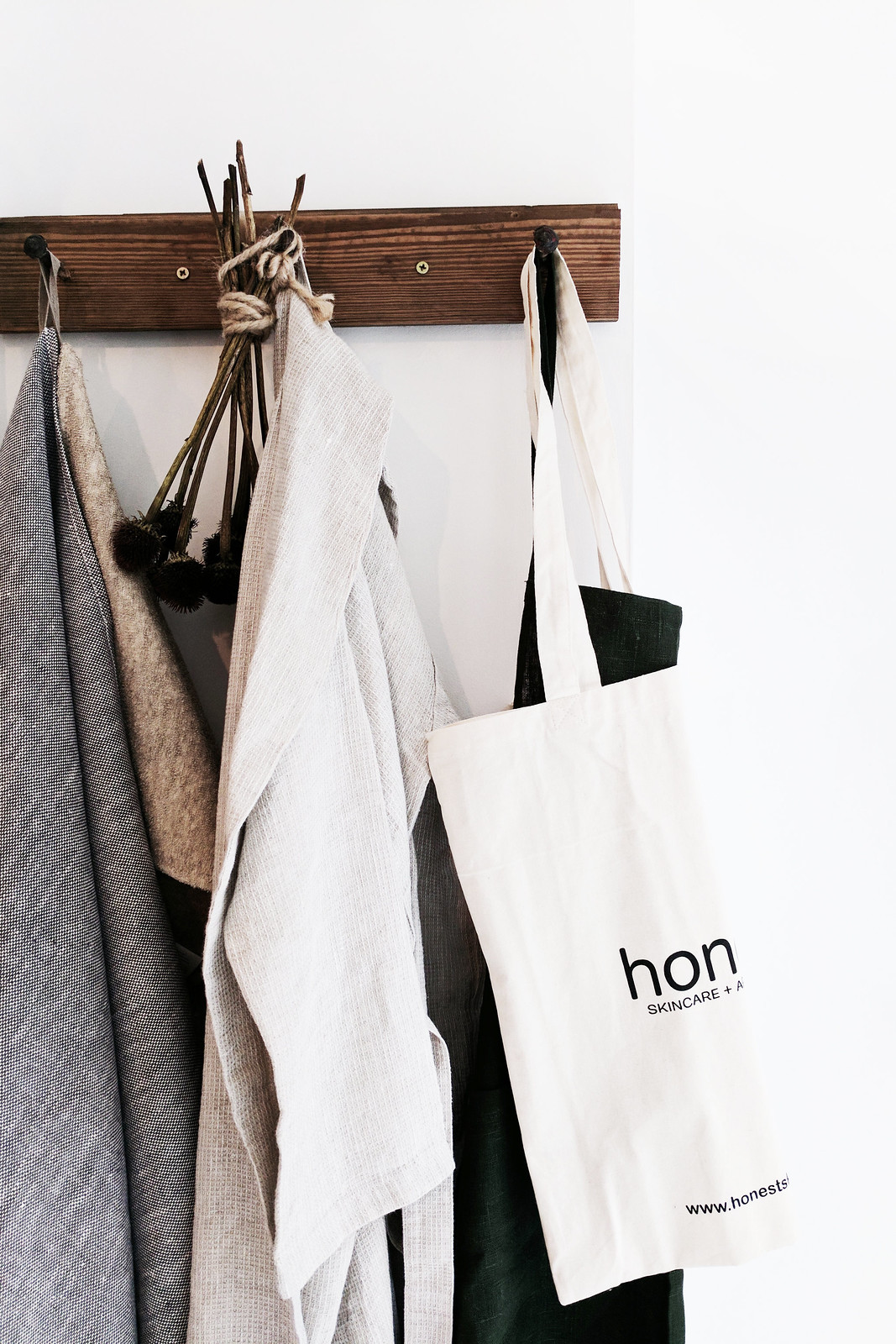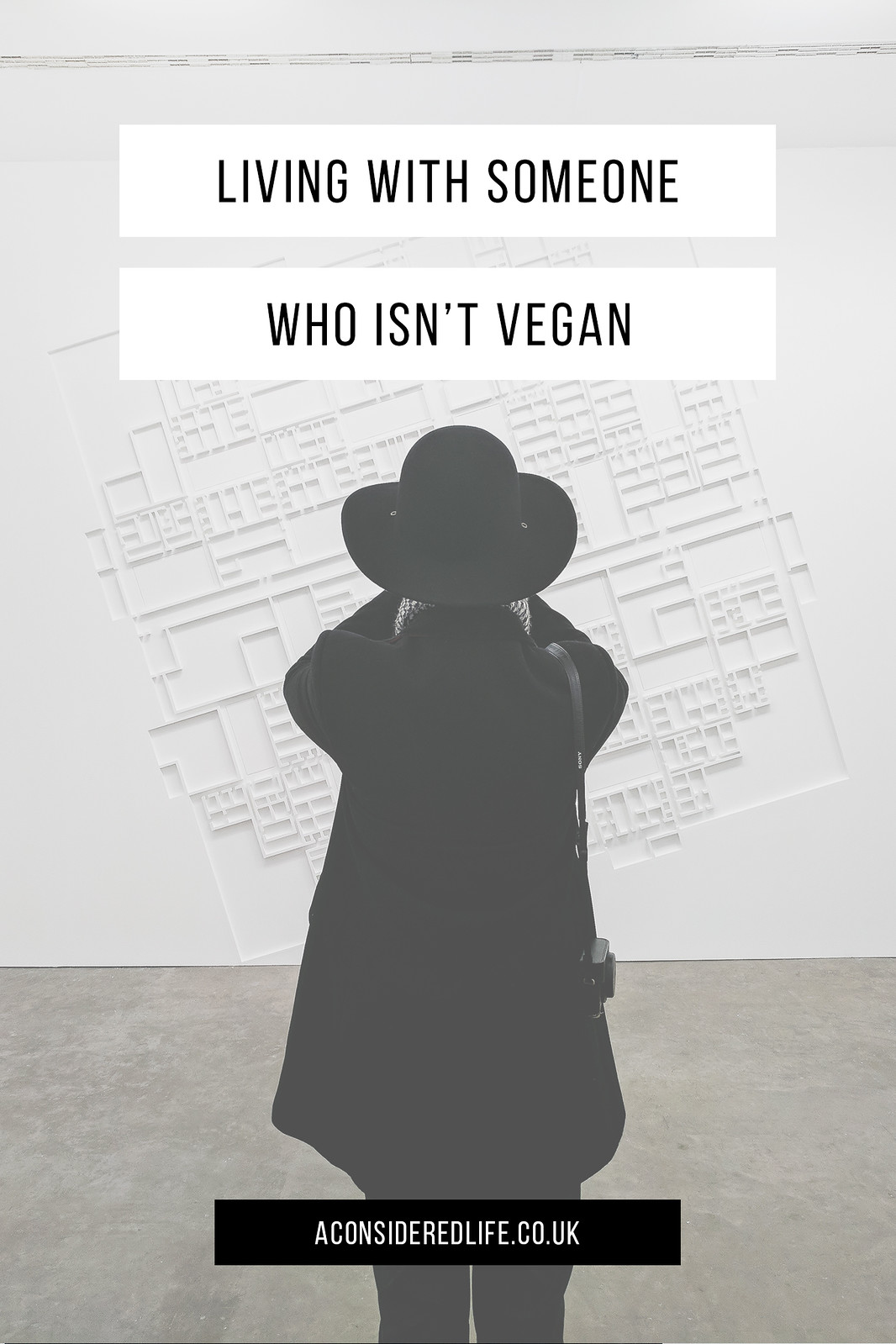
With 1-3% of the world's population living a vegan lifestyle, it's likely the person you fall in love won't be vegan. You might be willing to look past your partner's dietary choices or you might not. For some people that's a deal-breaker. I certainly thought it was, until I met Jack. Living with someone who isn't vegan can be a tough situation to navigate and it's certainly easier and more convenient when your diet and moral compass align.
I've been vegan for over a decade and I was vegan when I met Jack. He eats everything, he loves food. We cook the same meals and eat the same food. Eating plant-based at home wasn't ever an issue but there were some considerations we had to discuss, like what's allowed in the fridge? Can our kitchenware be used to prepare animal products? What can our combined shopping budget be used for? And there were some things Jack simply didn't understand at first, like why I was so weird about food prep and cross-contamination. Being vegan isn't my identify but it is a large part of it; it's important to me that my actions reflect my ethics and I'm loyal to those even in a relationship with someone who doesn't share the same values.
All relationships require compromise. You won't always agree on everything and you cannot forcibly change people or their way of seeing the world. You simply have to accept it's their choice and work around it the best you can. Every healthy relationship is a respectful one and while you might not share the same opinions on everything, it's important to love and respect that person for who they are.
If you live with someone who eats a lot of animal products and isn't prepared to compromise or respect your choices; or if you live with someone who is fickle about their food and is a fussy eater, you're going to find living with someone who isn't vegan a lot more difficult, perhaps even impossible. If someone isn't willing to respect your ethical decisions, goes out of their way to make you feel uncomfortable, or mocks you for your lifestyle, the problem is them. This goes for friends, family, and partners. Fourteen years later and I still have family members who don't "get it". Some people won't change, life goes on.
So what do you do when the person you live with isn't vegan?

Speak Honestly
Speak honestly with them about your lifestyle, why you make the decisions you do and how important it is. Sharing your reasons and communicating the significance of your decision to live a certain way helps others to understand and respect it. Don't be overbearing; talking about veganism when it comes up naturally is far more effective in the long term. Of course you're going to want the people who you love and care about to go vegan but you have to let people figure it out on their own. Be patient and not self-righteous. Love people for who they are. Don't use veganism as a stick to beat people with; be a resource for when they're ready.
I was vegan long before I met Jack and there wasn't much of a conversation about it when we started our relationship. Over time we've discussed why veganism is important and he's told me why he chooses not to be vegan. Am I OK with that? I can live with it. Being able to speak honestly with each other is so important for our relationship to work.
It can be a trickier conversation if you're transitioning to veganism while already in a relationship or living with someone. They might not understand why you've "suddenly changed" or dislike the perceived impact it may have on your life together. Share the sources of your information and the inspiration behind your decision. Know your answers to the most common questions about veganism and prepare for the common responses when you tell someone you're vegan, it can be helpful in expressing why you've made changes to the way you live your life.
Above all else, show respect to each other and don't be judgmental. It's easy to become frustrated when someone doesn't agree with you or share your ethical perspective. Stay calm, speak honestly, and share your worldview.
Set Boundaries
All relationships, regardless of lifestyle, have their own boundaries and those are set by talking about them. If you're a vegan living with someone who isn't, it's important to talk about how you're going to handle your mixed-diet household. Being vegan isn't just about what you put on your plate although for a lot of people that's where their understanding of veganism starts and ends. It can be surprising when someone asks for their food to be prepared separately, for utensils not to be mixed, and for grills not to be shared. There are plenty of boundaries non-vegans may be oblivious to, talking about them is the only way for everyone to understand each other.
There's no wrong or right boundaries, what one vegan is comfortable with another is not. What's allowed in the fridge? Can animal products be prepared and cooked in the same kitchenware? If you share a budget, are you OK with that money being spent on animal products? Will you both eat plant-based at home? Is buying animal products for guests something you're willing to do? Are you happy to cook and serve animal products for others? What happens if you go out to eat?
I won't pay for, cook, or serve anything that isn't plant-based and all our household products are vegan. I'm OK with Jack sharing his animal products with guests but I'm not OK with buying in those foods especially for them. It's very rare there are eggs or cheese in our kitchen and even rarer for meat, and if they are in the house they have to be stored separately, away from the plant-based foods. I'm not entirely comfortable with animal products being consumed in our home but I'm also reluctant to demand a ban. 99.9% of what Jack eats is plant-based and that's good enough for me. If Jack chooses to eat non-plant-based dishes when we go out to eat, that's on him.
What your boundaries are might be different, more relaxed or stricter, and that's perfectly fine. Compromise is an absolute must. You've got to figure out what works best for you and the people you share your space with. It's easy for non-vegans to overlook situations that vegans might find uncomfortable or unacceptable so don't blow up if mistakes happen; talk about it, set some boundaries, and you'll create a happier household together.
Talk It Out
There will be times when you encounter situations that trigger a response you didn't expect, both from yourself and the person you're living with. It's important to keep everything in perspective; these situations help us to identify what our boundaries are, they are an opportunity for us to talk it out and work through any hurdles we face.
You may never have thought about what would happen if an acquaintance challenges your veganism at dinner and your partner doesn't support you. You may find yourself angry that your shared chopping board was used to prepare animal products. You might even find your partner thinks you're being irrational when you refuse to let them put their takeout leftovers in the fridge. Whatever these encounters are that challenge you and however it makes you feel are simply opportunities for you to explore your thoughts and feelings with the people you care about.
Christmas was a tough one for me. We invited my family to our apartment for Christmas dinner and a roasted bird was pretty much expected. Looking back Jack and I should have discussed having a plant-based Christmas instead of just assuming it wasn't an option. Having a goose carcass in the kitchen was distressing for me and it was a reminder that talking about why these situations are so upsetting on a personal level is often much more important than discussing the ethical side of veganism with people.
Generally speaking people aren't trying to catch you out, make you feel uncomfortable, or cause you upset. Don't take it personally and don't hold grudges. More often than not people simply don't understand how something might have affected you. If you talk about why a situation has upset you or why you'd prefer things were done a different way, people are usually sympathetic and will try to remember for the future.
Let me know in the comments!
Pin It For Later:
